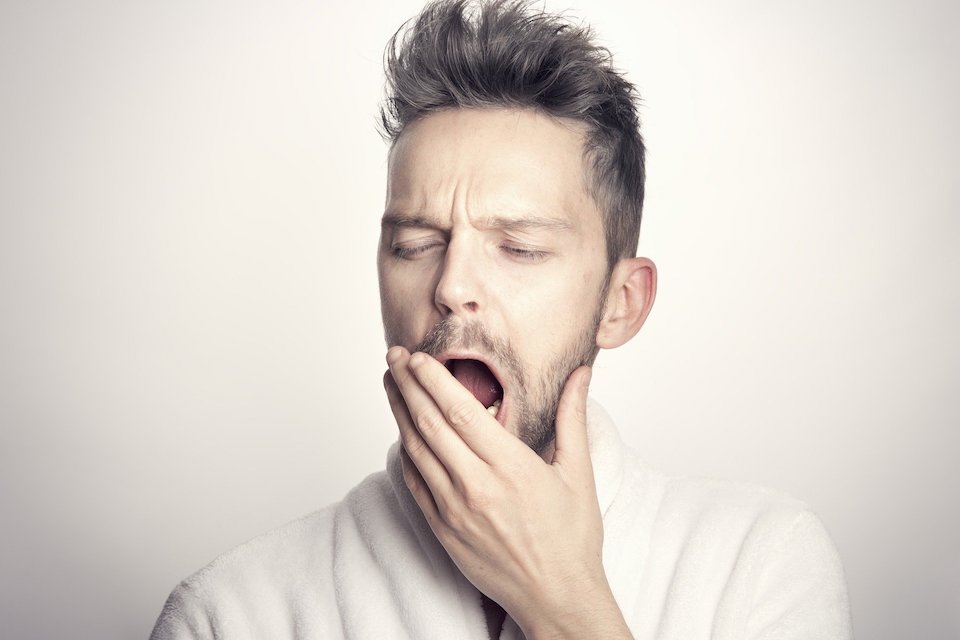
Sleep Awareness Day highlights the importance of quality sleep and how insomnia can have a devastating impact on our wellbeing. Andy Clarke tells us how signing up to Sleepstation through the Charity for Civil Servants helped improve his quality of life.
Insomnia means you regularly have problems sleeping, but the good news is, it usually gets better by making some simple changes to your sleeping routine. If you’ve experienced insomnia recently (for less than three months), it’s known as short-term insomnia. If it lasts three months or longer, it’s called long-term insomnia. It’s a common problem, and around a third of people will experience problems with sleep at some point - so you’re not alone.

Struggle to sleep
Before signing up to Sleepstation, I couldn't honestly remember a time when I slept well. I would struggle to fall asleep, wake up several times throughout the night and be exhausted by the morning before I even started my day.
I signed up to Sleepstation through the Charity for Civil Servants and worked with them to create a sleep diary. They provided tailored advice based on my diary entries and I’m sleeping better now than I’ve done in years.
Effective tips
Sleepstation gave me so many effective tips which have helped me switch off mentally and physically. For example, I never felt I had the time to read before now but switching off the TV and reading a book in bed has made a huge difference.
More energy
Sleepstation has helped me find the balance and combination of things that work for me and I feel like I can focus again. I feel like I have more energy and can concentrate the whole day, and knowing that I will likely sleep well each night means that I approach bedtime without a high level of anxiety.
As A Modern Civil Service, we take pride in this innovative approach to support our community. This clinically validated sleep improvement programme is designed by experts and can be accessed through the Charity for Civil Servants.
Simple tips to beat insomnia
◼︎Regular exercise can help lift tensions built up during the day
◼︎Maintain a cool, comfortable room
 ◼︎Cut down on caffeine. Caffeine in tea, coffee and fizzy drinks can all prevent a deep sleep. Alternatively, try sipping a warm milky drink before bedtime
◼︎Cut down on caffeine. Caffeine in tea, coffee and fizzy drinks can all prevent a deep sleep. Alternatively, try sipping a warm milky drink before bedtime
◼︎Relax and create a restful sleeping environment. Temperature, lighting and noise should be controlled so your bedroom helps you fall and stay asleep
◼︎Unable to sleep? Don’t lie there worrying. Get up and do something you find relaxing until you feel sleepy again, then head back to bed
Verdict from the Charity for Civil Servants
Jill White, Head of Service Insights at Sleepstation, and Linda Eades, Head of Caring Health and Wellbeing Services at the Charity for Civil Servants, emphasise the importance of supporting our Civil Service colleagues to boost their wellbeing.

“Through our partnership with the Charity for Civil Servants, we’re delighted that we’re able to provide life-changing sleep support across the Civil Service community.
“Poor sleep has a detrimental impact on both physical and mental health and by improving your sleep through Sleepstation, you can also make changes to your overall wellbeing,” said Jill.

“We are delighted to have been able to support almost 1,500 people throughout 2021 to access support from Sleepstation,” said Linda.
“In addition, we have undertaken many workplace sessions to raise awareness of the devastating effects poor sleep can have on the wellbeing of our lifelong community.”

5 comments
Comment by Stuart Rawlins posted on
I had insomnia for eight years and my sleep is a lot better than it used to be. Unfortunately a lot of the normal tips made it worse as it put more focus onto the fact I wasn't sleeping and what you focus on grows - the same for mental and physical health issues. (I had most mental health issues for most of my life, although I have gotten rid of them the last few years via coaching and deep work on myself). However, I have to say what has helped me is getting to a point where I'm not as bothered whether I slept or not. This is easier said than done (trust me I know), but by putting less importance on the importance of sleep and the repercussions of not sleeping, then I was more relaxed and thought about it less and less. The other one thing I did find useful more recently was to read before bed, but I do this out of pleasure and not a technique to get better sleep. Jen Lucas (a coach) has some useful videos on her website (Google Jen Lucas Three Principles) if you are struggling and need assistance. Another person to listen to more generally is Jamie Smart and his book Clarity started my journey from the bottom to where I am now.
Comment by Stuart Rawlins posted on
I also forgot to say that I am extremely glad to hear that the tips and additional support did help in Andy's case as not sleeping is not nice! I think if I sought help at an earlier point, then perhaps I wouldn't have had the issues I did. Seeking and asking for help was the best decision I made. Take care all!
Comment by Louise posted on
Either I'm misunderstanding or the third simple tip (◼︎Cut down on caffeine. Caffeine in tea, coffee and fizzy drinks can all prevent a deep sleep. Alternatively, try sipping a warm milky drink before bedtime) needs amending to remove the "reducing"?
Comment by Gavin Thomas posted on
Thank you Andy for sharing with us your story and for promoting the Sleepstation. It sounds like a really useful initiative to help to overcome the challenge of not being able to achieve a good quality level of sleep.
I have certainly found that since I have been taking regular walks either before or after dinner, and look to drink a glass of water before going to bed has helped me to improve my ability to get a good level of sleep.
I have also found listening to music before bedtime has helped to declutter my mind and helped me in getting to sleep.
Comment by Judith Mann posted on
Unfortunately the lighting and noise is difficult to control for me. My bedroom overlooks a busy main road with the usual lighting and noise. It does get quiet by 1am. Motorbikes and police sirens are the worst offenders. (Not sure why the latter need to have their sirens on in the early hours!) That being said I usually get to sleep quite quickly. The past few days though I have woken regularly at 2:30, which I suspect is a result of one of the two above! Do get back to sleep quickly though.